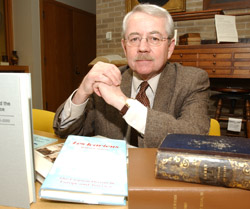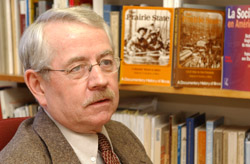University News
Robert P. Sutton Makes WIU Home to World's Largest Icarian Collection
April 22, 2004
MACOMB, IL - - Some of Western Illinois Universitys finest professors are students themselves, like history Professor Robert P. Sutton. He has made a career of study and research, which he gladly shares with students, scholars and the public.
Sutton has earned seven Faculty Excellence awards and three Professional Achievement awards for outstanding teaching and research in his 34-year career at Western. In 1993 he received the College of Arts and Sciences Outstanding Research Award. In keeping with his expertise, he teaches the Western history majors capstone course on writing and researching history.
Woven into his lifes work is an underlying passion for history. He is a scholar of American legal history, as well as the age of Jefferson and Jackson. In the mid-1970s, shortly after joining the history faculty at Western, his research interests expanded to areas associated with his new surroundings - - Illinois, Abraham Lincoln and the history of American communal utopias. He is recognized internationally for his expertise in utopias, which is the basis of nine of his 13 published books.
Suttons first, and continuing, passion for American legal history and the age of Jefferson and Jackson is consistent with his East Coast upbringing and education. A native of one the 13 Colonies (Pennsylvania), his early career flourished in the East. He was a pre-law major at Juniata College (1962), a highly regarded liberal arts school situated in the beautiful Appalachian Mountain Range, just east of his hometown of Altoona, PA. He followed in the footsteps of Thomas Jefferson, attending the College of William and Mary, where he was a lecturer and earned his masters degree (1964). He was an instructor and doctoral candidate at the University of Virginia, where he earned one of two Thomas Jefferson Foundation Fellowships, which allowed him to complete his dissertation (1967) on the legal history of the upper south.
Then, during his three years (1967-1970) of teaching, including two as history department chair, at Mansfield University (PA), I began to get an itch to turn my dissertation into a book, Sutton said.
In 1970 he received a prestigious grant from the National Endowment of the Humanities, which allowed him to complete his research in legal history at Virginia. That fall, Sutton ventured to the Midwest and Western Illinois University and discovered new interests, including the somewhat undiscovered subject of communal utopias, specifically the settlements of French Icarians.
Regional Collections Unit Created
This was a new research frontier, and multiple events came together like pieces of a puzzle for Sutton. Was it coincidence that the Icarians original settlement is less than 50 miles from Westerns campus?
Six years into his tenure at Western, Sutton was named director of Westerns newly-created Regional Collections, a unit of the new library being built to better serve the Universitys commitment to the academic mission and faculty research and to promote greater service to the region. The divided appointment had him working two-thirds time in collections and one-third time teaching history.
It was a vision of the University administration and new library director Pierce Grove to expand the definition of a library by building up an archives and special collections unit, Sutton explained. The desire was to identify something that would give the library and Western national recognition. The Icarian utopia communities within our region provided a unique opportunity for this. So I started going out and pulling in collections.
I got excited when I became aware of the limited study of the Icarian experience and communal living in general, Sutton said.
As director of the newly-created Center for Icarian Studies (1976) his tenacity and curiosity led the creation of the worlds largest collection of Icarian history, including a prized original first edition copy of Etienee Cabets Voyage in Icaria. Sutton picked up many of the collections - - which include original manuscripts, personal letters and photographs - - from 1976 to 1979, before he again got an itch to be back at teaching and researching. He continued to develop the collections as director of the center through the 1990s.
In 1990 Sutton took a sabbatical and ventured to Europe to finish his research on Icaria, touring three major collections in Paris, Amsterdam and London. Sutton completed the collection with a 1995 publication of a finding aid and a descriptive inventory to the rich Icarian history housed in Westerns Special Collections.
Until Suttons involvement in 1976, Nothing really had been done on this subject because 90 percent of the materials were in French, he said. I had studied French; thats why I waded into this, and thats why we were able to create the Center for Icarian Studies at Western.
The Icarian Utpoia
The Icarians were French idealists, middle-class skilled craftsmen led by Cabet (1788-1856), who were forced to leave their homeland in the mid-1800s because of their political beliefs, which included a communal society, Sutton explained.
The community was founded upon the principals of peace and justice which Cabet outlined in his book Voyage in Icaria. Cabets vision was based on 16th century scholar Sir Thomas Moore, author of the novel Utopia, he added.
They landed in Nauvoo, IL in the spring of 1849, along the Mississippi River, and purchased the temple square from the Mormons, who had exited the city after their leader, Joseph Smith, was killed in Carthage, IL in June 1844.
The Icarians constructed the most important secular utopia experience in U.S. history, Sutton said. It lasted 50 years, and at its peak the colony numbered over 500 members. However dissension over legal matters and the death of Cabet caused some members to leave this parent colony and move on to other Icarian locations in East St. Louis, Iowa and California.
Sutton was the first, and only, person to translate Cabets entire book, Voyage in Icaria, into English. He completed Travels in Icaria in 1985. Since then, he has written eight more books on the Icarians, interspersed with an award-winning books about Illinois, Rivers, Railways, and Roads: A History of Henderson County, Illinois, and the completion of his legal history studies in the book, Revolution to Secession: Constitution Making in the Old Dominion, which was published by The University Press of Virginia, 1989, and nominated for the Merle Curti Award in American Intellectual History. In 1992, Sutton wrote, and narrated a six-hour historical documentary, Illinois: Historic Panorama, that was broadcast by satellite to all Illinois schools on the WIU/ISBE Satellite Education Network and has been made available to high schools on video tape.
Suttons latest published work is the two-volume Communal Utopias and the American Experience (Praeger, Greenwood Publishing Group) detailing communities from 1732 to 2000. The first volume on religious communities was released in 2003. The second volume on secular communities from 1824 to 2000, was published February 2004. His most recent manuscript, Dictionary of Twentieth Century American Communal and Utopian History is scheduled for publication in 2005 by Greenwood Press.
Utopia is really a uniquely American experience, he added. America has always been conceived in some way as a utopia, even by the founding fathers. We invented sovereignty of the people and the concept that government is subject to the governed. Our Declaration of Independence is in effect a utopian document, a statement of America as a land where perfection can be aspired to, if not realized.
The type of communal society that flourished in the western Illinois region in the mid- to late-1800s can still be found today in the more than 600 intentional communities throughout the United States, Sutton said.
Sutton has served on the board of directors for the National Communal Studies Association and the historic markers committee of the Illinois State Historical Society. He also has served as a manuscript reviewer for the Oxford University Press, the University of Chicago Press, D.C. Heath & Company and several journals including the William and Mary Quarterly, Utopian Studies and Journal of the Early Republic. Since 1997, Sutton has served as the grievance officer for Westerns statewide faculty union.
Posted By: University Communications (U-Communications@wiu.edu)
Office of University Communications & Marketing



Connect with us: